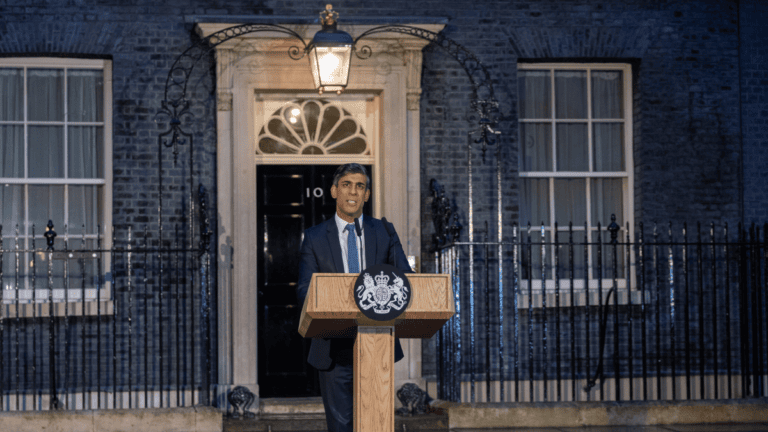
1.0 Introduction
On 14 March, UK’s Secretary of State for Levelling Up, Housing and Communities—MP Micheal Gove–unveiled a new definition for extremist groups in the UK, and a menu of criteria against which several of these groups will come under investigation [source]. The ongoing Israel-Hamas conflict has raised concerns about the wide-ranging risk of radicalisation. On hate crime, since 7 October, the Community Security Trust recorded 4,103 antisemitic incidents in the UK in 2023 – an increase of 147% compared to 2022. Tell MAMA also recorded a 335% increase in anti-Muslim hate cases in the past four months [source], [source]. While new guidelines are not statutory and will thus not affect existing criminal law, they apply to the operation of the government itself.
The new definition aims to prevent the government from legitimising—either as funding or direct engagement—groups that promulgate vitriolic ideologies. Those who deemed ‘extremist’ will not have access to government grants, ministerial meetings, and the senior civil service and public appointments.
2.0 New Definition of UK Extremism
According to UK guidance, extremism is the promotion or advancement of an ideology based on violence, hatred or intolerance, that aims to:
- Negate or destroy the fundamental rights and freedoms of others; or
- Undermine, overturn, or replace the UK’s system of liberal parliamentary democracy and democratic rights; or
- Intentionally create a permissive environment for others to achieve the results in (1) or (2).
2.1 Perceived Aims of UK Extremist Groups
2.2 Aim 1
Aim 1 (negate or destroy fundamental rights and freedoms): Behaviour against a group, or members of it, that seek to negate or destroy their rights to live equally under the law and free of fear, threat, violence, and discrimination. Including:
- Using, threatening, inciting, justifying, glorifying, or excusing violence towards a group to dissuade them from using their legally defined rights and freedoms.
2.3 Aim 2
Aim 2 (undermine, overturn, or replace liberal democracy): Attempts to undermine, overturn, or replace the UK’s system of liberal parliamentary democracy and democratic rights. Including:
- Advocating that the UK’s parliamentary democracy and democratic values and rights are not compatible with their ideology, and seeking to challenge, overthrow, or change our political system outside of lawful means.
- Using, threatening, inciting, justifying, glorifying, or excusing violence towards citizens, in order to dissuade them from participating freely in the democratic process.
- Subverting the way public or state institutions exercise their powers to further ideological goals, for example, through entrism, or by misusing powers or encouraging others to do so.
- Using, threatening, inciting, justifying, glorifying, or excusing violence towards public officials including our armed forces, police forces and members of local, devolved or national legislatures, in order to dissuade them from conducting their obligations freely and fearlessly, without external interference.
- Establishing parallel governance structures which, whether they have formal legal underpinning, seek to supersede the lawful powers of existing institutions of state.
2.4 Aim 3
Aim 3 (enabling the spread of extremism): Intentionally creating a permissive environment for behaviour in aim 1 or aim 2. Including:
- Providing an uncritical platform for individuals or representatives of groups or organisations that have showed behaviour in either aim 1 or aim 2.
- Facilitating activity of individuals or representatives of groups or organisations that have showed behaviour in either aim 1 or aim 2, including through provision of endorsement, funding, or other forms of support.
- The dissemination of extremist propaganda and narratives that call for behaviour in either aim 1 or aim 2.
- Attempts to radicalise, indoctrinate, and recruit others to an ideology based on violence, hatred or intolerance, including young people.
- Consistent association with individuals or representatives of groups or organisations that have showed behaviour in either aim 1 or aim 2 without providing critical challenge to their ideology or behaviour.
- If any behaviour listed in aim 1 or aim 2 has occurred previously, a refusal by the individual, group or organisation that conducted the behaviour to rescind, repudiate or distance themselves from the behaviour.
3.0 Overview of Named UK Extremist Groups
According to Hansard—the UK’s parliamentary transcript database — Gove used parliamentary privilege to name:
- Patriotic Alternative
- British National Socialist Movement
These two groups allegedly espouse right-wing populist, nativist, and authoritarian ideologies, albeit both groups routinely deny these accusations.
- Muslim Association of Britain (MAB)
- CAGE
- MEND
This consortium is under review for its perceived affiliations with the Muslim Brotherhood. During parliamentary debate, Gove stressed groups promulgating an Islamist orientation would also go under review.
3.0 Patriotic Alternative
 Fig.1 Official Logo of Patriotic Alternative
Fig.1 Official Logo of Patriotic Alternative
The Patriotic Alternative is regarded as ‘the largest and most active fascist movement operating in the UK today’ [source]. It holds institutional status and produces its own ‘truths’ under the guise of educational material and journalistic/ opinion pieces.
It emerged from the fractures within the British National Party (BNP), and an older but lesser known group, the British National Socialist Movement. In essence, Patriotic Alternative is a community building and activism group with institutional status founded in 2019 by Mark Collett. Collett was also the former Head of Publicity of the BNP, which, too, has expressed sympathy towards Neo-Nazism [source].
The mission of Patriotic Alternative is to ‘raise awareness on the demographic decline of native Britons in the UK, the environmental impact of mass immigration and the indoctrination and political bias taking place in British schools’ [source].
3.1 Campaigning Tactics
A cursory glance of the movement’s website reveals a younger generation seeking to present themselves as a ‘white pride’ organisation. It conflates traditional far-right causes (e.g., repatriation of immigrants and the retrenchment of citizenship rights for immigrants) with others, such as preserving the countryside and helping the homeless.
It has sought to piggyback on protests against hotels accommodating refugees. Including those which led to riots in Liverpool last year [source].
In so doing, it deploys strategies of online activism and traditional campaigning. Not to mention, grassroots activities – camping and hiking trips – and conferences. Further, it routinely distributes educational material through its website and leaflets. Its activities are mainly promoted on its website and on its Telegram account. The latest Telegram post displays its ‘patriots’ holding placards warning about the ‘white genocide’ and ‘great replacement’ in different counties and touristic sites.
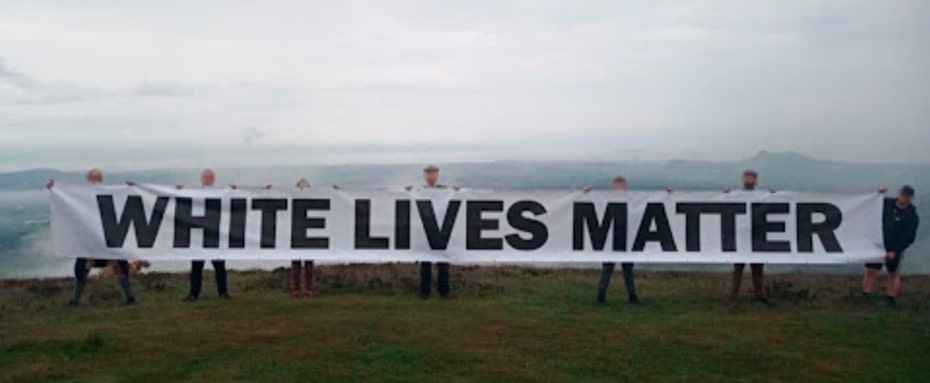 Fig.2 PA activists in the Pentland Hills, Scotland.
Fig.2 PA activists in the Pentland Hills, Scotland.
3.2 The Kids Are Alt-Right: A Conspiratorial Background
The ‘white genocide’ is a conspiracy theory widely disseminated amongst white nationalist/ supremacist circle. It espouses the notion that the white population will soon face extinction. It frequently overlaps with a similar conspiracy theory, the ‘Great Replacement,’ which states that non-white/non-western people will replace white/western people as part of a supposed orchestrated plan designed by a global liberal elite. The UK extremist movement also presents these theories as ‘scientific truth’ as part of its ‘alternative curriculum’ readily available on its website. It is especially designed to provide guidance to parents wishing to ‘protect’ their children from the British educational system.
Of equal note, the website also provides templates of letters to be sent to local authorities justifying the need for home schooling, as well as didactic material.
Considering Gove’s newly proposed definition of extremism, Patriotic Alternative has since encouraged its readers to identify supposed discursive strategies deployed by governmental bodies to delegitimise the movement and its like-minded partners. The conspiratorial background of Patriotic Alternative attempts to legitimise hate towards ethnic minorities, the LGBT+ community, and purveyors of Leftism, constructed as malign to interests of white people.
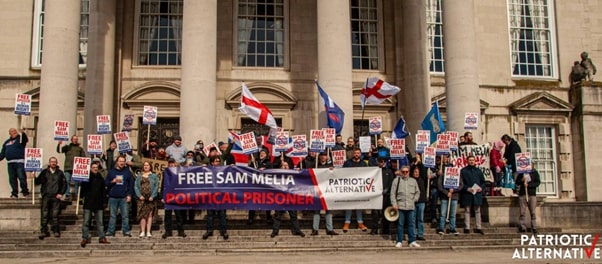 Fig.3 Patriotic Alternative Rally for the Release of Sam Meila, previously indicted on charges of racial hatred.
Fig.3 Patriotic Alternative Rally for the Release of Sam Meila, previously indicted on charges of racial hatred.
4.0 British Nationalist Socialist Movement
 Fig.4 Official Logo of BM
Fig.4 Official Logo of BM
Colin Jordan founded the British National Socialist Movement (now referred to as the British Movement) in 1968. It is an outgrowth of the National Social Movement (NSM), founded in 1962.
Frequently on the margins of the British far-right, the BM has a long-standing history for its association with violence. Originally conceived as a political party, it has since assumed a posture similar to that of a pressure/ activist group. However, it is periodically dormant.
Considering its size and limited resources, as well as its overt extremist ideology, the UK’s “British Movement” developed an impressive impact. It amassed a considerable media coverage, especially in its formative years.
4.1 Promulgating Neo-Nazi Ideology
The movement itself was at the centre of the establishment of the World Union of National Socialists, a global neo-Nazi network run by both Jordan and George Lincoln Rockwell, the leader of the American Nazi Party [source]. Further, the movement’s significance equally reverberated amongst several other idealogues. Among them John Tyndall and Martin Webster who would later sit at the helm of the National Front in 1970s, as well as Andrew Brons who became a British National Party MEP in 2009 [source].
A cursory glance of the movement’s website suggests its adherents subscribe to similar views propagated by Patriotic Alternative. Prime among them include ‘white genocide’, the ‘excess’ presence of racial and ethnic ‘outsiders,’ and the sanctity of the British nation-state. Unlike Patriotic Alternative, however, the Movement does not actively offer ‘didactic’ or ‘pedagogical’ resources. Rather, it promulgates its ideology through traditional campaigning (e.g., leaflets and flyers).
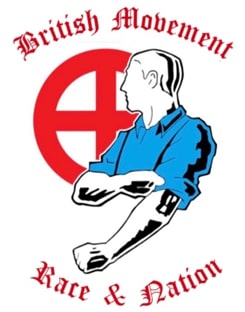 Fig.5 BM Propaganda
Fig.5 BM Propaganda
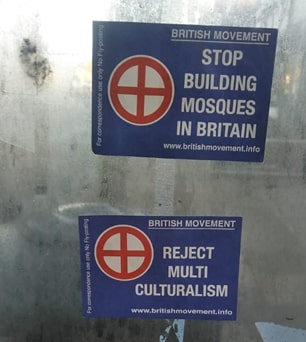 Fig.6 BM Propaganda
Fig.6 BM Propaganda
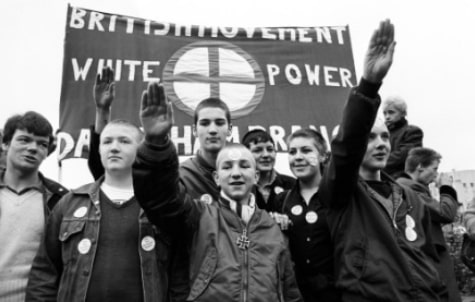 Fig.7 Members of the British Movement hold up a banner emblazoned with the words ‘White Power’. They are giving Nazi salutes during a march from Hyde Park, London, to Paddington Recreation Ground in 1980.
Fig.7 Members of the British Movement hold up a banner emblazoned with the words ‘White Power’. They are giving Nazi salutes during a march from Hyde Park, London, to Paddington Recreation Ground in 1980.
5.0 Muslim Association of Britain (MAB)
 Fig.8 Official Logo of MAB
Fig.8 Official Logo of MAB
According to MAB, the movement evolved from the Muslim Student Society (MSS) in 1961. In 1997, it manifested into the iteration that exists today.
However, in 2015, an independent UK inquiry reported that MAB was a splinter-group from the Islamic Society of Britain (ISB). The ISB was an overtly pro-British organisation attractive to educated, middle-class British Muslims. Not all of whom were comfortable being too close to the Muslim Brotherhood and its subsidiaries. Namely Hamas in the Palestinian occupied territories. These tensions among British Muslims over the situation in the Middle East led to the formation of the MAB [source].
In the 1990s, the Brotherhood established public-facing and national organisations in the UK to promote their views. None openly identified with the Brotherhood and membership remained—and still remains — a secret.
5.1 A UK Subsidiary of the Muslim Brotherhood?
Organisations under the Brotherhood’s remit included:
- Islamic Society of Britain (ISB)
- MAB
- Muslim Council of Britain (MCB)
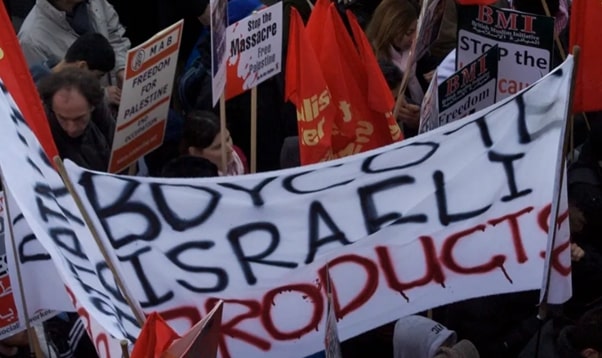 Fig.9 MAB Pro-Palestine Protests in London, 2024.
Fig.9 MAB Pro-Palestine Protests in London, 2024.
MAB became politically active, notably in connection with Palestine and Iraq, and promoted candidates in national and municipal elections. Of note, MAB were also active partners in a security dialogue with the police. They collaborated with the police in ejecting Abu Hamza. Hamza was a militant Salafist preacher from a mosque in north London. Ever since, MAB has taken part in the mosque’s governance.
According to the UK inquiry, MAB appears much less active than it was some twenty years ago now with little political profile. In 2014, MAB claimed a membership of under 600 people and maintains eight welfare houses and associated mosques. However, MAB has links to the Cordoba Foundation, a think tank which is associated in the Brotherhood. However, it claims neither affiliation to the Brotherhood nor a lobby organisation on its behalf. Yet, it is associated with the Federation of Islamic Organisation in Europe (FIOE), established by the Brotherhood in 1989.
MAB stated that it supported social integration and encouraged young people to be active and responsible citizens. However, an independent 2014 review found that the MAB had not clearly and publicly promoted a vision of Muslims living as integrated British citizens.
[Source].
6.0 CAGE
 Fig.10 Official Logo of CAGE
Fig.10 Official Logo of CAGE
Founded in October 2003, CAGE is most commonly known for providing support for political Muslim detainees held at Guantanamo Bay. Although, it has extended its remit to detainees held under legislation accorded to the War on Terror.
At present, the group’s stated mission is to ‘campaign against state policies developed as part of the GWOT’ [source]. As such, CAGE publishes reports and engages in advocacy that criticises British counter-terrorism measures. In so doing, it raises awareness through media, schools, universities, and faith-based organisations.
In addition to campaigning on behalf of terrorist suspects and opposing counter-terrorism measures, CAGE has also supported convicted terrorists [source]. Including:
- Dr. Aafia Siddiqui, an al-Qaeda associate convicted in the US of attempted murder in 2010 [source]
- Djamel Beghal, convicted in 2005 for his involvement in an al-Qaeda-inspired plot to bomb US targets in Paris in 2001
- Nizar Trabelsi, jailed in 2003 for his involvement in a plot to target a military base in Belgium
6.1 Disproportionate Judicial Targeting in the UK?
Further, CAGE claims that UK terrorism legislation used disproportionately against Muslims. It maintains that Muslim offenders receive longer sentences and less clemency compared with their non-Muslim counterparts. However, the UK Home Office analysis does not support these allegations. For instance, Home Office data on all terrorism-related convictions since 9/11 have a terrorism to non-terrorism ratio of 3:2. By contrast, convictions specifically Islamism-inspired offences evenly split between terrorism and non-terrorism legislation [source].
Of note, a 2015 CAGE fundraising event in London featured speakers from alleged extremist organisations pledging their support for CAGE. This included:
- The Federation of Student Islamic Societies (FOSIS). A student group criticised by the coalition in 2011 for refusing to assume a clear stand against extremism.
- Islamist group Hizb ut-Tahir, which seeks to create an expansionist Islamist state.
- Muslim Public Affairs Committee UK, a pressure group accused of anti-Semitism.
7.0 Muslim Engagement and Development (MEND)
 Fig.11 Official Logo of MEND
Fig.11 Official Logo of MEND
Established in 2008, the emergence of MEND is because of two intervening factors. First, the challenges faced by British Muslims under the twin onslaught of high volumes of negative media output and the misrepresentation of Islam. Not least, Muslims fuelling hostile public attitudes and low levels of (formal) political participation among British Muslims.
Second, the effort to move away from a Muslim civil society organisation as a body for communal representation to a model for advancing public accountability through active citizenship and collective advocacy. In short, MEND seeks to establish credentials of legitimacy on direct engagement with British Muslims through mass mobilisation on issue-based politics.
However, MEND allegedly exploits legitimate concerns of those wishing to end discrimination against Muslims. It purportedly pushes an alarmist ‘us vs. them’ schema. To illustrate, the Henry Jackson Society found that MEND – during its 2017 ‘IAM’ campaigns – provided a platform to extremism-linked individuals. With some events even hosting speakers with a high-profile extremist history – including:
- Incitement to violence
- Sympathy with convicted terrorists
- Support for corporal punishment against Jewish people
- LGBT+ community
- Minority Muslim sects and ‘disbelievers’
8.0 Future Trajectories: UK Culture Wars?
Palestine Action, which conducts direct action protests against Israeli arms manufacturers in the UK, issued a joint statement with CAGE.
Gove has since offered assurances that the new definition would not apply to either:
- Gender-critical campaigns
- Those with conservative religious beliefs
- Trans-activists
However, MPs fearful that such groups could ultimately end up subject to the definition disagreed.
For instance, the Scottish National Party MP Joanna Cherry raised concerns over the status of the LBG Alliance. It is routinely described as a ‘hate group’ because, according to Cherry, had ‘raised hitherto unfashionable but now vindicated concerns’. Prime among them includes the prescription of puberty blockers and the rights of same-sex attracted people [source]. However, in 2023, judges ruled that Mermaids – a charity that supports transgender, non-binary, and gender-diverse children – could not challenge the LGB Alliance’s charitable status [source].
8.1 Re-branding Protest as Extremism?
Detractors suggest it is nothing more than a ploy by the Conservative Party to silence its critics. Just Stop Oil – an environmentalist activist group – is fast becoming a bête noire for Conservative MPs, with its direct action targeting major public events and political gatherings. As such, some suggest that the Conservative Party may judicially target those it deems unfavourable. Likewise, Greenpeace stated that the government’s attempts to capture more groups under the mantle of extremism risks fuelling the very extremism it claims to repudiate [source].
Moreover, it has heightened fears amongst Black Lives Matter (BLM) supporters that the movement itself may go under investigation. The movement previously faced criticism from Conservative MPs. Not least, the movement appeared as a co-signatory of the statement by CAGE and Palestine Action.
9.0 Conclusion
The Conservative Party now faces a delicate balancing act of categorizing pro-Palestine or pro-Israel groups as extremist in the UK or not, as the new definition of extremism originated from concerns stemming from the Israel-Hamas conflict. If the Conservative Party targets one strand more than the other judicially, they will likely face accusations of perpetuating extremism. Or rather, will be seen to re-brand legitimate protest as a form of extremism to silence its detractors.
In addition, the new definition is neither legally binding nor does it existing criminal law affect. As such, detractors maintain that it appears to be little more than empty verbiage [source]. If we were to judge its efficacy, we would need to consult the rate at which the government judicially targeted XYZ groups or how quickly their governmental privileges were revoked. Yet, the new definition will likely undergo either amendments or legal challenge before it even comes to fruition.
The post UK Government: Courting, Containing, or Curtailing Extremists? first appeared on JOSSICA – The Journal of the Open Source Strategic Intelligence and Counterintelligence Analysis.
